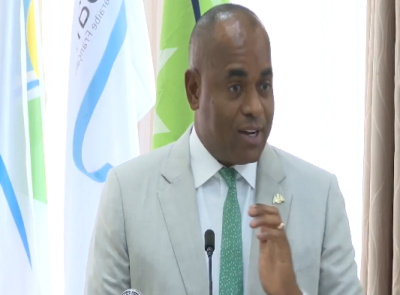
ROSEAU, Dominica, Sept 26, CMC – Dominica’s Prime Minister, Roosevelt Skerrit, has called for a “structural change” at the Barbados-based Caribbean Examination Council (CXC) as part of the reform of the education system that is urgently required in the Organisation of Eastern Caribbean States (OECS).
“This is about us and about the future of our children and the future of our society. We have to equip our children with what they need today to lead this very difficult world,” Skerrit told the 1Oth meeting of the Council of Education Ministers of the OECS, which ends here later on Friday.
“Our system cannot be seen to be preoccupied with only preparing students for examination, and if you ask me, I think there has to be a serious structural change at the CXC. Simply adding subjects to be taken at examination level at the CXC is not a positive movement,” Skerrit said.
The CXC was established in 1972 under agreement by the participating governments in the Caribbean Community (CARICOM) and according to its website, assures the global human resource competitiveness of the Caribbean through the provision of syllabuses of the highest quality; valid and reliable examinations and certificates of international repute for students of all ages, abilities and interests; services to educational institutions in the development of syllabuses, examinations and examinations’ administration, in the most cost-effective way.
CXC comprises 16 participating countries: Anguilla, Antigua and Barbuda, Barbados, Belize, British Virgin Islands, Cayman Islands, Dominica, Grenada, Guyana, Jamaica, Montserrat, St. Kitts and Nevis, St. Lucia, St. Vincent and the Grenadines, Trinidad and Tobago, and Turks and Caicos Islands.
The first examinations for the Caribbean Secondary Education Certificate® (CSEC) were offered in 1979 in five subjects. After CSEC, CXC has introduced a comprehensive suite of qualifications to meet the needs of the region, including the Caribbean Primary Exit Assessment(CPEA), Caribbean Certificate of Secondary Level Competence (CCSLC), Caribbean Vocational Qualification (CVQ), Caribbean Advanced Proficiency Examination (CAPE), and the CXC Associate Degree (CXC-AD).
Skerrit told the ministers from the sub-regional grouping that they had to put education reform high on their agenda, reiterating that reform of the education system is needed urgently, for the children of the sub-regional grouping to prepare for the challenging period ahead.
“You are fortunate as ministers to have the opportunity now to be the leaders in the transformation and reform that we need in this Caribbean today. This is a global imperative; this is a regional emergency that we have to dramatically address the structural and systemic challenges of education.
“Yes, we have addressed access to education, yes, we are addressing the issue of inclusivity, yes, we have addressed to a large extent the issue of teacher training, but there must be a paradigm shift”.
Skerrit, who once served as minister of education here, said there must be a paradigm shift, “or else the society will reap what we sow in the education system.
‘I don’t want anybody to take what I am saying personally because that’s what happens when we speak of those things,” he added.
The meeting here is advancing the goals outlined in the OECS Education Sector Strategy (OESS) 2012–2026, which was developed in response to the unique needs of Small Island Developing States (SIDS) and allows OESS to provide a roadmap for harmonised and impactful education reform across member states of the sub-regional grouping.
The meeting is also facilitating robust dialogue and knowledge exchange on shared priorities, including inclusive education, quality learning outcomes, and system-wide reform”.
A statement issued before the meeting noted that it will also seek to accelerate and sustain the OECS Digital Learning Ecosystem through coordinated action to expand digital infrastructure, improve access to devices and connectivity, integrate high-quality digital content and platforms, and strengthen educator and learner digital competencies to enhance equity and resilience in teaching and learning.
OECS Director General, Dr. Didacus Jules, called on member states to urgently empower the teaching profession, noting that teachers remain the heartbeat of education.
“Digitisation is merely a tool, but the human element forever remains integral, and that is why we must move urgently to professionalise the teaching service.
“The time has come for us to establish national or regional teaching councils that elevate teaching to a profession of high standards, continuous learning, and prestige,” Jules said, adding, “This is not a technical option; it is a moral imperative.
“It is a targeted investment. If we expect teachers to prepare our students for the future, then we must prepare the teaching profession itself for the demands of this new era. I therefore urge every member state…every teachers union and every stakeholder to summon the will to move decisively in that direction”.
Jules said empowering the teaching profession “is not the responsibility of teachers alone, or ministries alone. It requires the full weight of government policy, union partnership, and societal respect.
“Let us be clear, empowered teaching is not a slogan. It is the very foundation on which resilient, inclusive digital education will stand,” Jules added.
CMC/gr/ir/2025

